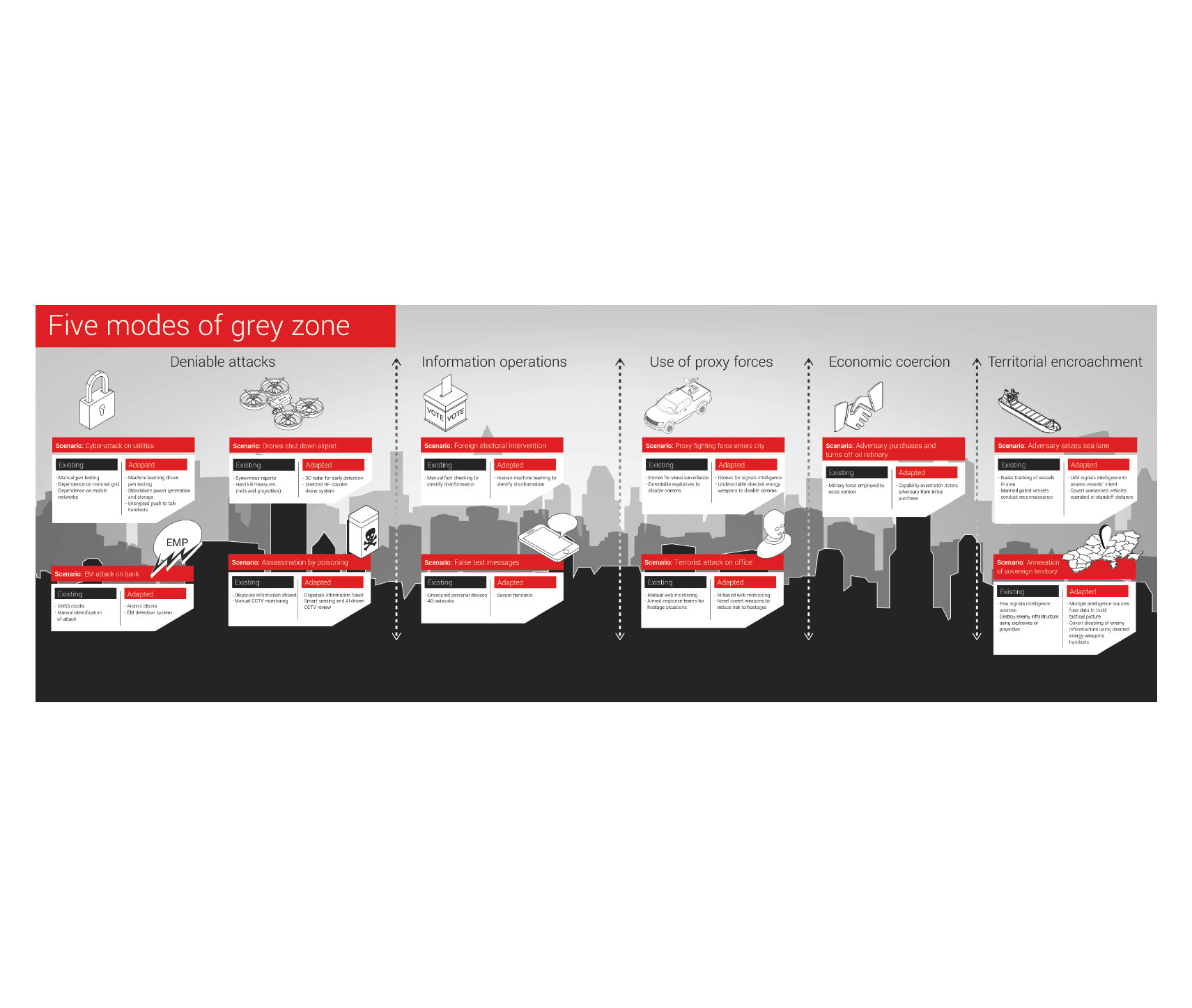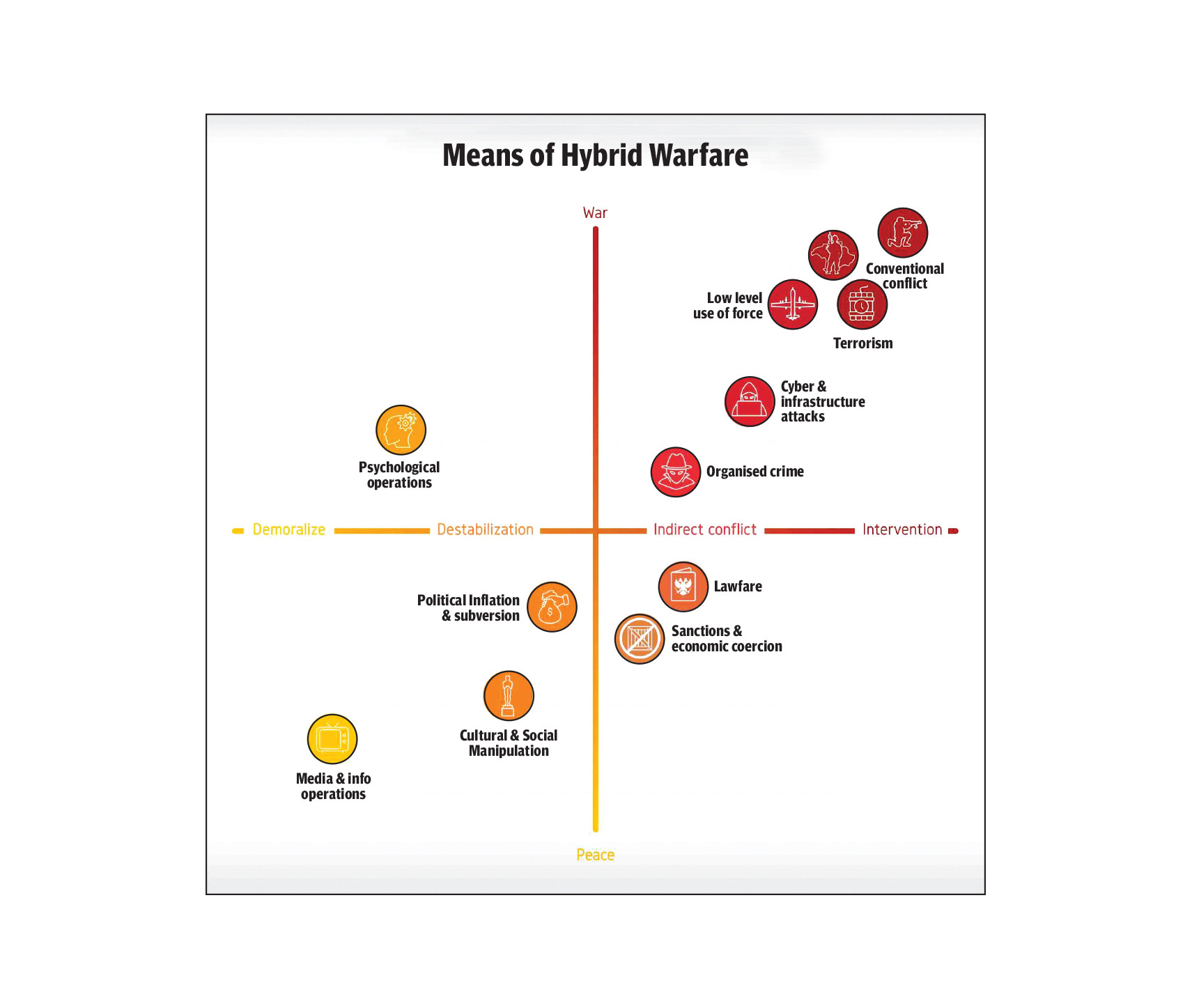In hybrid scenarios, political turmoil, a fragile economy and illiterate society can lead any country towards further instability because security and development is strongly linked to different aspects of economic, political and social factors. Therefore, the thinking and attitudes of individuals, parties and institutions have a significant effect on a nation’s overall economic and political situation.
One outcome of this is that ‘culture’ for a given country can assume the role of an important protective tool. A message of a hundred-and-forty characters by someone powerful or influential, can make or break a ‘war’. A prevalent political scenario can be defused or stoked by the switch between one narrative and another.
“This is why even the positive efforts of Pakistan are blurred by a few words from a powerful country,” says Fareed Rais, a senior journalist based in Islamabad who is associated with a private news channel. “To put Pakistan under pressure, they portray its negative image even though they know that it is Pakistan that can make this region secure from potential threats,” he pointed out.
Battle of perceptions
Referring Islamabad’s role in Afghanistan, he said it was the same “so-called terrorist” Pakistan that facilitated negotiations between the United States and the Taliban in Qatar. The very same Pakistan, maligned ad nauseum in a certain part of the West, played an important role in the evacuation of American and NATO forces and other trapped people after the Taliban captured Afghanistan. “But even though the entire world acknowledged this role, there is a wider war of interests at play and that has made India the watchman [of the West] in this region.”
The anchor-journalist pointed towards the now exposed Indian fake news mills. “All this time, there was an impression being propagated that our country is a hub and sponsor for terrorism. But investigations within the West revealed how India had been using the fake news network exposed by Disinfo Lab against Pakistan. Such duplicity also came to light with the arrest and confession of Indian spy Kulbhushan Yadav,” he said.

The use of propaganda and carefully assembled narratives, especially against nations with a majority Muslim population, has been increasing since the Global War on Terrorism began more than two decades ago, said Quaid-e-Azam University Assistant Professor Dr Nadeem Mirza. According to him, Pakistan’s opponents and ill-wishers have been trying to take advantage of internal differences – along economic, political, ethnic, social, religious and civil-military lines – to drive a wedge between various segments of Pakistani society. “Political instability, in particular, has further aggravated the situation,” he said.
Dr Nadeem pointed out the rampant use of fake news by the opponents of our country to sow seeds of division in society and tarnish the credibility of Pakistan abroad. "The EU Disinfo-Lab report on the distortion of Pakistan's real face, the spread of fake news about it and its involvement in efforts to influence the mindset of the general public in many states, indicates that Pakistan's opponents want to isolate it by presenting it as an irresponsible state,” Dr Nadeem maintained.
Talking about potential threats of disinformation to society, senior journalist and former director CEJ-IBA Kamal Siddiqi says that misinformation or disinformation is spread deliberately. There are some countries that spread false information. Referring to Indian involvement, Kamal Siddqi said that recently when fast bowler Hasan Ali dropped a catch in the T20 World Cup, many Indians spread rumors that he belonged to a particular religious group and his house was attacked.
Although, all this was a lie, but for politically-motivated and ulterior information that is clearly false, innacurate or incomplete is spread. The threat fake news and misinformation poses is especially grave for nations like Pakistan, where the rate of even basic literacy – much less media literacy – is very low. Even educated people in such countries are at risk of falling prey to bad-faith news and information.
Shortcomings and weaknesses
Pointing out Pakistan’s weakness in this arena, Fareed Rais stressed that in today’s world, any nation or organisation skilled in the art of managing perception rules the modern conflict space. “The world could have been informed in a more impactful way about the Indian human rights violations in Indian Illegally Occupied Jammu and Kashmir, but our strategy was not as effective as it should have been. If we had chalked out a clear plan to declare India a human rights violator, our own picture today would not have been what has been created,” he maintained.
Raees said that we have some of our own shortcomings, adding that in the United States in the 1990s, bombing occurred in Oklahoma and in the memory of the victims a museum was established there. We have had thousands of explosions in the last 20 years but nobody knows and remembers the victims.
On weak strategy and non-continuity of policies, Fareed Rais says, "Our weak lobbying and policies also became a reason for not winning the trust of other countries and stakeholders." During the Afghan jihad, he said, it was the same United States, the CIA, and Pakistan adopted the narrative of holy war.

The United States used Pakistan against the Soviet Union in Afghanistan to maintain its power and make the world uni-polar. When the United States left Afghanistan, the same elements with which the USSR was defeated, the United States labeled them as terrorists and blamed Pakistan for it.
The ground realities cannot be distorted. Stable countries do not have to rely on others. As compared to these countries Pakistan’s image is weak. In addition, India also made a negative propaganda to tarnish Pakistan's image, and tried to defame us in every way.
“There is no doubt that Pakistan is a hospitable nation. Here tourists are not only welcomed but helped in every way,” Talat Masood said. “The rate of donations given here is the highest in the world, which is a cause of pride. However, we cannot improve our image even through foreign policy unless we achieve internal stability.”
Contextualising the loopholes
Talking about the political history, the journalist says that due to the unfair distribution of the Indian Subcontinent and its resources, Pakistan has faced challenges since 1947. Every leadership tried to improve things but they also made mistakes, he said, adding that we should not forget that this is how nations and societies are formed in the world.
As a result of the insurgency that arose from 1947 to 1971 due to the India conflict and the negative role of world powers, a part of Pakistan, East Pakistan, was separated. The enemy started a negative propaganda against us, which led to the country’s negative perception, which we should have rejected, Raees said.
“Internationally, it happens that countries have to give their own narrative and concept. Our enemy began to spread with intensity that was not our image. However, Zulfikar Ali Bhutto's execution, Zia-ul-Haq's ten-year rule, then the events of the 90s, all these issues benefited our enemy to the fullest to tarnish Pakistan's reputation.”
He said instability in social policies harmed a lot of Pakistan. During the era of Zulfikar Ali Bhutto, liberalism was promoted. During the time of Ziaul Haq, it was Islamisation and under the Pakistan Muslim League-Nawaz and Pakistan People's Party duopoly over Pakistan’s affairs, provincial politics was promoted. “Fights in the name of provincialism, linguistics and religion further weakened our social system.”
Talat Masood says, there is no doubt that Pakistan's economy is in a bad shape and democracy is weak. “The government and political parties should take steps to strengthen democracy and make the parliament strong. But this is not happening. Policies here are made behind closed doors while it is very important to take the nation into confidence”.
Talat further said, "We should recognise the fact that we have some weaknesses of our own because of which the world does not have a very good view of us. Our people want the country to grow so that their standards of living can improve, but you see every government has increased the country's debt and the country's economy has been at the mercy of other countries, the IMF or the World Bank for 75 years”.
According to the analyst, for real democracy in the country, steps are necessary to quell the impression that there are two centers of power in the country. This is essential for strengthening democracy and improving its image.
National security policy and culture
It is good that the government has evolved the National Security Policy. For the first time in Pakistan’s history, the security policy also focuses on economics, food security, population problems along with national security and international relations.
Hopefully, important sectors like culture will be given due importance in the country's policies so that this national security policy can be truly beneficial in bringing improvements in public problems as well as building Pakistan’s positive image in the world.
Former Executive Director Lok Virsa Talha Ali Khan Kushvaha said that education and media are the two main sources of propaganda in modern times. If we want to expose the malicious face of opponents against Pakistan, we need to use the media with its true potential.
Regarding this Talat Masood stated that except Quaid-e-Azam and Liaqat Ali Khan no leader focused on education and strengthening institutions and even now more than 30 per cent of the people are illiterate.
From this, you can have an idea where the world has reached and at what level we are. He said many of Pakistan's problems are indirectly related to education, but many of our politicians are also not educated and elections are also contested not on the basis of performance but money. This hinders Pakistan’s progress, although it has immense potential, which needs to be harnessed.
Talah Kushvaha says information technology has entered our homes today and everything is within the reach of our children. They have access to information about all the global crises and issues.
In such circumstances, we have to strengthen the roots of our younger generation, train them well about their religious and cultural values so that they may not buy the ideas being sold on the Internet, Talah said. The importance of culture has become even more important as you have no other defense but cultural traditions, he added.
Today is the era of propaganda and experts in the world's top intelligence agencies have done a lot of work; especially Brussels says education is a tool of propaganda. If you keep teaching in your own way by controlling education, you will control the mind and it is very dangerous, the culture expert Talah maintained.
He says there are only two propaganda tools: media and education. If a country controls both of them, it means that it is controlled and there is no need for any police, army, or weapons. We do not see any culture policy, and if so, it does not seem to be implemented anywhere, Talah added.
The same is the case with other matters even though efforts have been made to formulate a good culture policy; there are many aspects that need to be worked out, he added. Thus culture is an important part of our economic, political, diplomatic, and security policy which cannot be separated from society.
Some countries even use cultural activities to maintain 'soft power' and soft identity, which are directly linked to international relations or national security, because peace or unrest is also attributed to culture and cannot be isolated from the basic beliefs or values of society.
In broader perspective, society’s stability is also an important component in hybrid warfare and there are instances of opponents being targeted and weakened through cultural invasion in history
